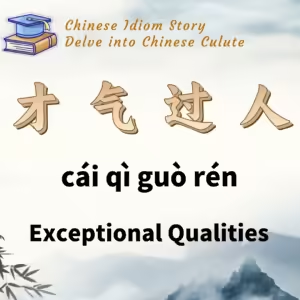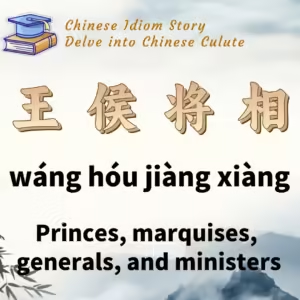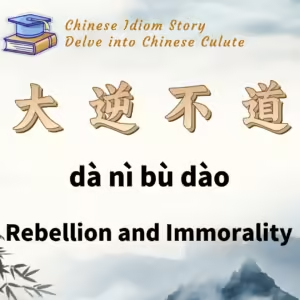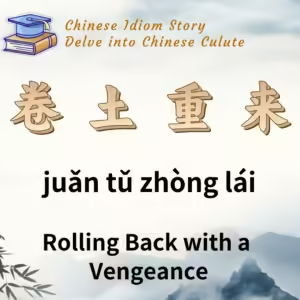
Chinese Idiom: 包羞忍耻 (Bao Xiu Ren Chi)
English Translation: Endure humiliation and shame
pīn yīn: bāo xiū rěn chǐ
Idiom Meaning: This idiom signifies enduring humiliation and shame. “包” (bāo) means to contain or bear, “忍” (rěn) means to endure, and “耻” (chǐ) refers to shame. Together, the idiom describes someone who bears and tolerates humiliation or disgrace.
Historical Source: 《史记 · 项羽本纪》, 唐代杜牧《乌江亭》诗
Idiom Story:
In July 209 BCE, during the late Qin Dynasty, Chen Sheng and Wu Guang led a peasant uprising against the Qin regime. At that time, Xiang Yu and his uncle Xiang Liang raised an army in Wu (modern-day Suzhou, Jiangsu) to support the rebellion. Although they initially had only 8,000 soldiers, these soldiers were mostly relatives and close friends of the Xiang family, making them fiercely loyal and exceptionally brave. With this foundation, Xiang Yu gradually built a formidable force that became one of the key players in overthrowing the Qin Dynasty.
During the Chu-Han Contention, Xiang Yu, who had been winning battles, eventually faced defeat. Surrounded by Han forces at Gaixia (in present-day Lingbi County, Anhui), Xiang Yu managed to break through the encirclement but fled south to the Wu River (near modern-day Hexian County, Anhui) with only 28 men left. Thousands of Han soldiers were in pursuit.
As Xiang Yu reached the riverbank, the local pavilion chief had a boat ready to help him cross the river. The chief urged Xiang Yu to flee, saying, “The land in Jiangdong may be small, but it spans thousands of miles and is home to hundreds of thousands of people. You can still become a king there. I have the only boat here; please cross the river quickly and regroup your forces. Otherwise, the Han soldiers will catch up, and you’ll have no chance.”
Xiang Yu smiled bitterly and replied, “The heavens have doomed me. Why should I go back across the river? Besides, when I first crossed the river with 8,000 Jiangdong soldiers to fight against Qin, I was full of ambition. Now that only I am left, how could I face the people of Jiangdong again? Even if they still respect me as their king, I would feel deeply ashamed.”
To express his gratitude, Xiang Yu gave his beloved horse, Wuzhui, to the pavilion chief, saying, “You seem to be a kind person. I have ridden this horse through countless battles, and it can travel a thousand miles in a day. I cannot bear to kill it, so I give it to you.”
Xiang Yu dismounted, and the pavilion chief took the horse, but Wuzhui refused to board the boat, repeatedly turning its head to look at Xiang Yu. With tears in his eyes, Xiang Yu waved his hand and ordered the chief to leave. Just then, the Han soldiers arrived. Xiang Yu let out a mighty roar, charged into the Han forces, killed a Han general, and slew hundreds of soldiers. He sustained over ten injuries and, seeing no way out, drew his sword and committed suicide.
Xiang Yu’s refusal to flee across the river and seek a life of ease has been praised by poets throughout history. During the late Northern Song Dynasty, as the Jurchen Jin forces invaded, the ruling elite of the Song Dynasty fled south, abandoning the safety of the nation and the suffering of the people. Witnessing this, the famous female poet Li Qingzhao was reminded of Xiang Yu’s resolve not to seek refuge in Jiangdong and, in anger, wrote the timeless verse “Summer Days Poem”:
“Alive, a hero among men; dead, a hero among ghosts. To this day, we remember Xiang Yu, who refused to cross the Jiangdong.”
The poem’s meaning is clear: in life, one should strive to be a hero; in death, one should remain valiant and honorable. We remember Xiang Yu because he chose to die heroically rather than live in disgrace as a king in Jiangdong.
This verse, with its simple language and profound meaning, evokes a sense of tragic grandeur and has often been cited by later generations to express their own patriotism and willingness to sacrifice for their country and people.
In fact, even before Li Qingzhao, the Tang Dynasty poet Du Mu visited the place where Xiang Yu had taken his life. Reflecting on Xiang Yu’s heroic deeds and the tragic end of his 8,000 soldiers, Du Mu composed a seven-character poem at the Wujiang Pavilion:
“Victory and defeat are unpredictable in war; true men can endure shame and humiliation. The sons of Jiangdong are many and talented; if Xiang Yu had crossed the river, who knows what might have happened?”
This poem suggests that the outcomes of war are uncertain, and a true man can endure temporary defeat. The land of Jiangdong had many talented people, and had Xiang Yu crossed the river, a comeback might not have been impossible.
From this story and Du Mu’s poem, the idiom “包羞忍耻” (Bāo xiū rěn chǐ) emerged.






